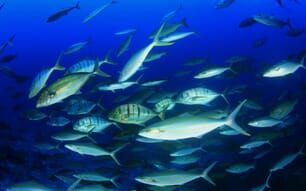Marine protected areas were acknowledged globally as effective tools to mitigate the threats to oceans caused by fishing. Several studies assessed the effectiveness of individual MPAs in protecting fish assemblages, but regional assessments of multiple MPAs are scarce.
Moreover, empirical evidence on the role of MPAs in contrasting the propagation of non-indigenous-species (NIS) and thermophilic species (ThS) is missing. We simultaneously investigated here the role of MPAs in reversing the effects of overfishing and in limiting the spread of NIS and ThS.
The Mediterranean Sea was selected as study area as it is a region where 1) MPAs are numerous, 2) fishing has affected species and ecosystems, and 3) the arrival of NIS and the northward expansion of ThS took place.
Fish surveys were done in well-enforced no-take MPAs (HP), partially-protected MPAs (IP) and fished areas (F) at 30 locations across the Mediterranean. Significantly higher fish biomass was found in HP compared to IP MPAs and F. Along a recovery trajectory from F to HP MPAs, IP were similar to F, showing that just well enforced MPAs triggers an effective recovery. Within HP MPAs, trophic structure of fish assemblages resembled a top-heavy biomass pyramid.
Although the functional structure of fish assemblages was consistent among HP MPAs, species driving the recovery in HP MPAs differed among locations: this suggests that the recovery trajectories in HP MPAs are likely to be functionally similar (i.e., represented by predictable changes in trophic groups, especially fish predators), but the specific composition of the resulting assemblages may depend on local conditions.
Our study did not show any effect of MPAs on NIS and ThS. These results may help provide more robust expectations, at proper regional scale, about the effects of new MPAs that may be established in the Mediterranean Sea and other ecoregions worldwide.
August 2014


